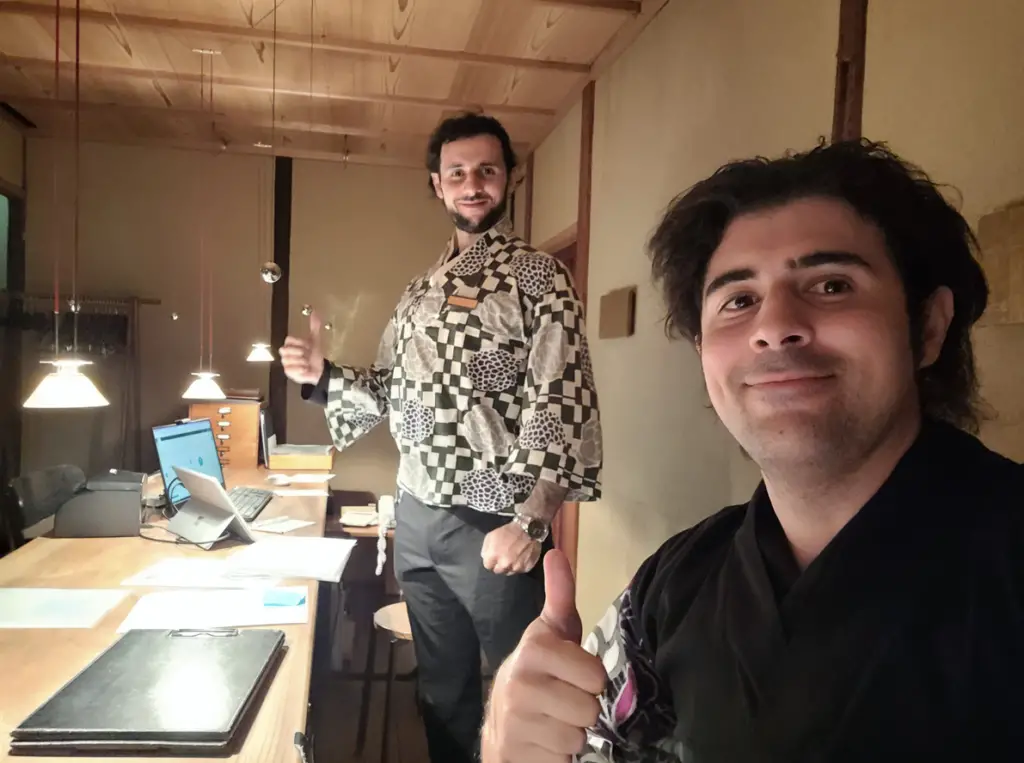The Japanese language is riddled with expressions that communicate a feeling rather than a literal definition. Here are 5 common expressions:

“Gozaimasu” ございます
Gozaimasu is not a word in and of itself, but is an honorific that is attached to common phrases like arigato or ohayo. The result is a heightened level of politeness, respect, and humility that is difficult to quantify in the English language. Saying arigato gozaimasu has a different vibe than a “thank you very much,” and perhaps it’s the lack of a literal translation of gozaimasu that gives it a transcendental feeling. I’m no expert though, so you’ll need to consult the elderly Japanese sages on the true meaning of gozaimasu and how it came to be.
“Otsukaresama” お疲れ様
Otsukaresama is a Japanese expression that is typically said at the end of a day of work, often used in place of “good work” or “good job today.” However, the literal definition is hard to pinpoint in English, though it has its roots in the Japanese word tsukare 疲れ which means “tired.” As such, the applicability of otsukaresama is far wider than just the workplace. In fact, staff members at the gym will often say otsukaresama as you are leaving, as though to honor the efforts you put into the workout.
“Ohayo” おはよう
Ohayo or ohayo gozaimasu is often used as a “good morning” expression in Japan, and many will tell you that this is what it actually translates to. Wrong. The Japanese word for “good” is yoi while “morning” is asa, but do we say yoi asa? Not at all. This is because the Western idea of how to greet each other in the morning is simply different to the Japanese. So, what does ohayo gozaimasu mean? Again, no literal translation, but it has its roots in the word hayai 早い, which means “early” or “you’re early.”
Hence, the expression ohayo, while used in place of “good morning,” actually has other applications as a greeting. A common example is at the workplace, where coworkers that are coming into contact for the first time that day will say “ohayo” as a form of greeting, even if it’s already evening. As a night shift worker, I found it particularly strange to be getting “ohayo‘s” from my colleagues, but they explained to me its true meaning which was quite a surprise to me.
“Itterasshai” 行ってらっしゃい
Itterasshai is a Japanese expression that is said to a person “going on a journey,” even if it’s just down to the local 7-Eleven. The word is derived from a combination of the word iku 行くmeaning “to go” and irasshai いらっしゃい meaning “welcome.” As such, the “literal” meaning of itterasshai is something like “go and be welcomed back.” However, the feeling conveyed with this expression is more like “have a safe journey,” and you can pretty much use it whenever someone is leaving your company but will return at a later time.
“Osu!” 押忍!
Osu 押忍 is an expression you often hear in the world of Japanese martial arts or even in the military. It has a meaning similar to “roger that!” though its applicability is far more extensive. There are several theories as to how the expression originated, though it’s widely accepted that it was first used in Japanese military, navy, and martial arts environments. It’s also said to be a contraction of the expression ohayo gozaimasu, only taking the first “o” and the last “su” to form osu (pronounced oss).
Nowadays, the word is also used as a casual greeting in the workplace and between close friends. It also has wide applicability in work or sports environments and can be used in place of hello, thank you, roger that, and even goodbye! In its true essence, osu is simply an acknowledgement of sorts, like “I acknowledge your actions” or “I acknowledge the order you’ve given me.” As someone with limited Japanese speaking ability, it’s such a handy word!
Of course, if you are planning to visit Japan, you’ll need a way to get around the country as efficiently and affordably as possible. Japan Rail provides an abundance of travel passes to suit your travel needs. So whether you are traveling individually or as a group, the JR Pass is every traveler’s go-to for getting around and making the most of your time in Japan!

